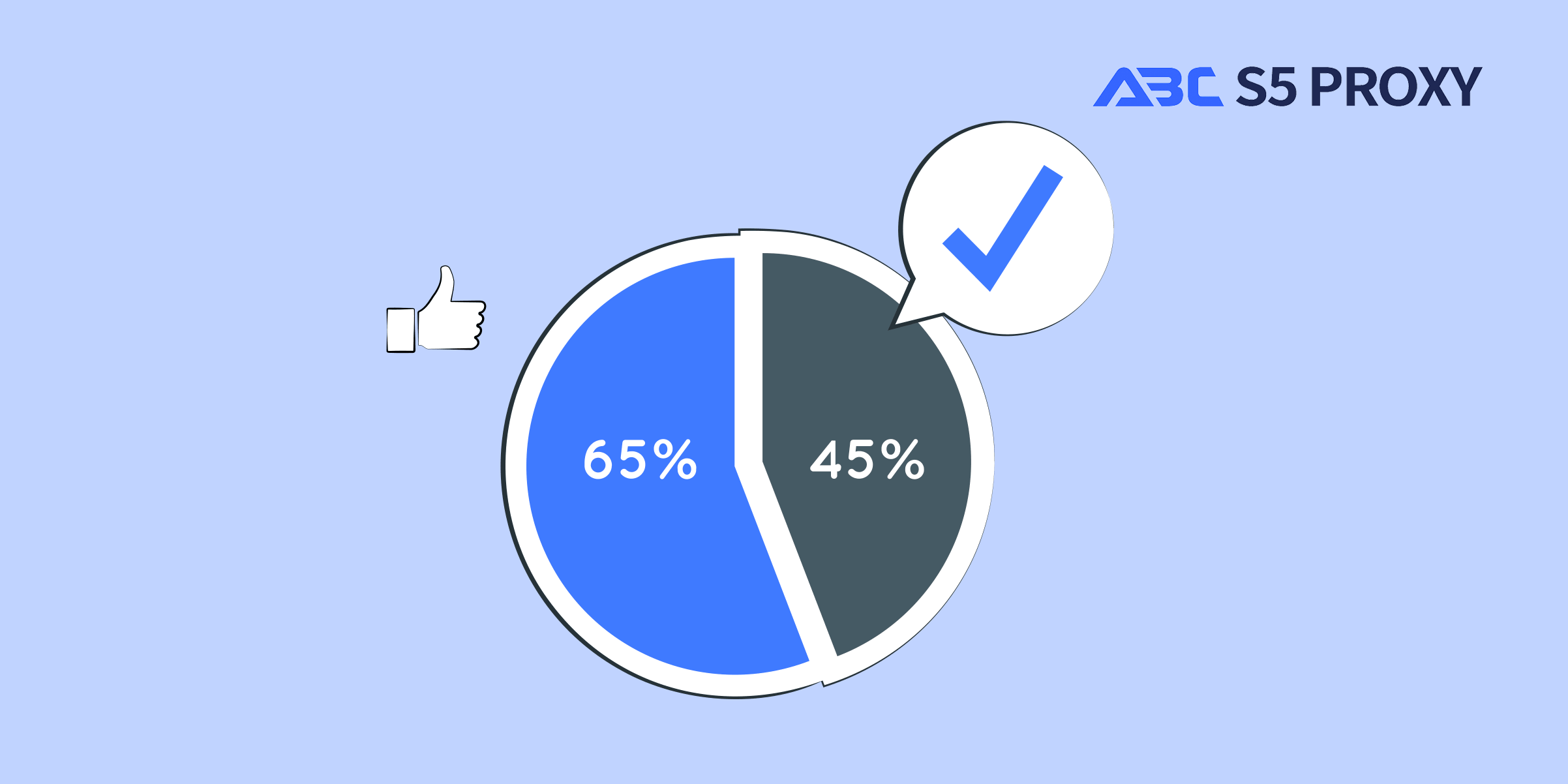Residential Proxies
Allowlisted 200M+ IPs from real ISP. Managed/obtained proxies via dashboard.

Proxies
Residential Proxies
Allowlisted 200M+ IPs from real ISP. Managed/obtained proxies via dashboard.
Residential (Socks5) Proxies
Over 200 million real IPs in 190+ locations,
Unlimited Residential Proxies
Use stable, fast, and furious 700K+ datacenter IPs worldwide.
Static Residential proxies
Long-lasting dedicated proxy, non-rotating residential proxy
Dedicated Datacenter Proxies
Use stable, fast, and furious 700K+ datacenter IPs worldwide.

Web Unblocker
View content as a real user with the help of ABC proxy's dynamic fingerprinting technology.
Proxies
API
Proxy list is generated through an API link and applied to compatible programs after whitelist IP authorization
User+Pass Auth
Create credential freely and use rotating proxies on any device or software without allowlisting IP
Proxy Manager
Manage all proxies using APM interface

Proxies
Residential Proxies
Allowlisted 200M+ IPs from real ISP. Managed/obtained proxies via dashboard.
Starts from
$0.77/ GB
Residential (Socks5) Proxies
Over 200 million real IPs in 190+ locations,
Starts from
$0.045/ IP
Unlimited Residential Proxies
Use stable, fast, and furious 700K+ datacenter IPs worldwide.
Starts from
$79/ Day
Rotating ISP Proxies
ABCProxy's Rotating ISP Proxies guarantee long session time.
Starts from
$0.77/ GB
Static Residential proxies
Long-lasting dedicated proxy, non-rotating residential proxy
Starts from
$5/MONTH
Dedicated Datacenter Proxies
Use stable, fast, and furious 700K+ datacenter IPs worldwide.
Starts from
$4.5/MONTH
Knowledge Base
English
繁體中文
Русский
Indonesia
Português
Español
بالعربية

Title: Understanding the Importance of IP Quality Score in Cybersecurity
In the realm of cybersecurity, one of the critical factors that often goes unnoticed is the IP quality score. An IP quality score is a measure used to evaluate the reputation and reliability of an IP address. It plays a crucial role in identifying and mitigating potential security threats, ensuring the integrity of networks and data. In this blog post, we will delve into the significance of IP quality scores in cybersecurity and explore how they help in safeguarding systems from malicious activities.
To begin with, let's understand what an IP quality score is. An IP quality score is a numerical value assigned to an IP address based on various factors, such as the IP's historical behavior, spamming activities, malware distribution, and involvement in cybercrime. The score helps cybersecurity professionals determine the trustworthiness of an IP address and its likelihood of engaging in malicious activities. A high IP quality score indicates a good reputation, while a low score signifies a potential threat.
One of the primary reasons why IP quality scores are essential in cybersecurity is their role in preventing cyber attacks. By analyzing the IP quality score of incoming traffic, organizations can identify and block suspicious IP addresses that may be associated with hacking attempts, phishing schemes, or other cyber threats. This proactive approach helps in reducing the risk of data breaches and unauthorized access to sensitive information.
Moreover, IP quality scores are instrumental in maintaining the reputation of an organization's IP address. In the digital world, a tarnished reputation can have severe consequences, including being blacklisted by email service providers or search engines. By monitoring and improving the IP quality score, organizations can ensure that their IP addresses are not flagged as sources of spam or malware, thus preserving their online credibility and trustworthiness.
Another critical aspect of IP quality scores is their role in enhancing network security. By utilizing IP quality scores as a part of their security protocols, organizations can effectively filter out malicious traffic, identify patterns of suspicious behavior, and block potential threats in real-time. This proactive approach helps in strengthening the overall security posture of the network and mitigating the impact of cyber attacks.
Furthermore, IP quality scores are essential for maintaining compliance with industry regulations and standards. Many regulatory bodies, such as GDPR, HIPAA, and PCI DSS, require organizations to implement robust security measures to protect sensitive data. By incorporating IP quality scores into their cybersecurity strategy, organizations can demonstrate due diligence in safeguarding data and ensuring compliance with regulatory requirements.
In conclusion, IP quality scores play a crucial role in enhancing cybersecurity defenses, protecting networks from malicious activities, and maintaining the reputation of organizations in the digital landscape. By leveraging IP quality scores as a proactive security measure, organizations can mitigate risks, prevent cyber attacks, and ensure the integrity of their data and systems. As cyber threats continue to evolve, the importance of IP quality scores in cybersecurity cannot be overstated, making them a valuable tool in the fight against cybercrime.
Featured Posts
Popular Products
Residential Proxies
Allowlisted 200M+ IPs from real ISP. Managed/obtained proxies via dashboard.
Residential (Socks5) Proxies
Over 200 million real IPs in 190+ locations,
Unlimited Residential Proxies
Use stable, fast, and furious 700K+ datacenter IPs worldwide.
Rotating ISP Proxies
ABCProxy's Rotating ISP Proxies guarantee long session time.
Residential (Socks5) Proxies
Long-lasting dedicated proxy, non-rotating residential proxy
Dedicated Datacenter Proxies
Use stable, fast, and furious 700K+ datacenter IPs worldwide.
Web Unblocker
View content as a real user with the help of ABC proxy's dynamic fingerprinting technology.
Related articles

A Comparative Analysis of Websockets and HTTP
Title: A Comparison of WebSocket and HTTP ProtocolsWebSocket and HTTP are two common protocols used in web development, each serving different purposes and offering unique features. In this blog post, we will explore the differences between WebSocket and HTTP protocols.WebSocket is a communication protocol that provides full-duplex communication channels over a single TCP connection. This allows for real-time data transfer between a client and a server, making it ideal for applications that require low latency and high-speed data exchange, such as online gaming, chat applications, and live streaming.On the other hand, HTTP (Hypertext Transfer Protocol) is the foundation of data communication on the World Wide Web. It is a request-response protocol that is used for fetching resources from a server, such as web pages, images, and videos. While HTTP is widely used for loading web pages and transferring files, it is not suitable for real-time communication due to its limitations in maintai

How to Evaluate IP Quality Score
Title: Understanding the Importance of IP Quality Score in Online SecurityIn the digital age, the concept of IP quality score plays a crucial role in ensuring online security and protecting against malicious activities. An IP quality score is a numeric value assigned to an IP address based on various factors such as reputation, behavior, and history of the IP address.Having a high IP quality score indicates that the IP address is trustworthy and has a good reputation, while a low score may suggest that the IP address is associated with spamming, phishing, or other fraudulent activities. Online platforms and services use IP quality scores to identify and block potentially harmful IP addresses, thereby safeguarding their users and maintaining a secure online environment.Businesses and organizations can also benefit from monitoring and optimizing their IP quality score to protect their online assets, reputation, and customer data. By understanding and prioritizing IP quality scores, they

The Ultimate Guide to the Best Discord Servers for ABCProxy Users
Title: Exploring the Best Discord Servers: A Closer Look at ABCProxyDiscord has become a popular platform for communities to come together, share interests, and connect with like-minded individuals. Among the multitude of Discord servers available, ABCProxy stands out as one of the best for those seeking a unique and engaging experience.ABCProxy offers a wide range of features and services that cater to different interests and preferences. From gaming communities to creative hubs, there is something for everyone on this versatile server. The community is welcoming and active, with members always ready to engage in lively discussions and share valuable insights.One of the key highlights of ABCProxy is its focus on providing a secure and reliable environment for its users. With dedicated moderators and strict rules in place, the server maintains a respectful and inclusive atmosphere where everyone feels safe and valued.In addition to its strong community and security measures, ABCProxy a